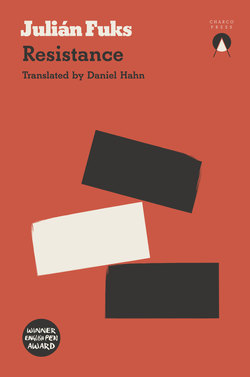Читать книгу Resistance - Julián Fuks - Страница 16
На сайте Литреса книга снята с продажи.
Оглавление10.
It was always assumed that the story began in Germany, but if the family was Jewish, and even if it wasn’t, if the family existed since times unimaginable just like every family exists, all deriving from the same distant absolute forefather, then it’s obvious that this beginning was arbitrarily defined and that it could have come at any time, in any ancient place inhabited by human beings. It was assumed that the story began in Germany because that’s where our name came from, and also because there, in a still-mythical genealogy, one of our ancestors had been the father of botany – earning himself a flower and a colour that make reference to his name, a flower and a colour that we have also inherited. But these were incidental and somewhat irrelevant details. The true story of that half of the family started much later, among those who headed for Romania, buying land in Transylvania and adapting their writing to their new language. In some unrecorded village, then, the grandfather I never knew was born, an Abraham of legend, not very far from where my grandmother was born, one Ileana, whose name seemed strange to me even if my father spoke it with immeasurable fondness. Both of them Jews, both worried at the start of a century which from its beginnings promised to be gruesome, both scared by the growing antisemitism threatening those close to them, at a given moment in the 1920s they emigrated together to Buenos Aires. There, in 1940, as news of the war that had broken out became grimmer and grimmer, and when the letters from the many relatives sent to the camps were already becoming scarce, there, in 1940, they conceived my father.
As for the other half of the family, the plot-line is less precise, perhaps because of my mother’s narrative style, which is summary and diffuse, the evolution of worn-down stories that once bored her, perhaps because of the lack of a climax or a single central tension. Those origins took us back to an unknown region in Italy, but it was only later that I realised the name didn’t actually support this, implying Spanish origins instead. From Spain, I believe, they set off for Peru with their aristocratic privileges, to make up a Catholic elite in Lima which some senile governor thought necessary. There followed generations of relative wealth, in material and anecdotal terms, highlights of which included the case of a great-great-grandmother or a great-great-great-grandmother who wasted away, starving herself out of love for a man, an episode my mother considered romantic. It must have been my grandmother Leonor, whom I remember only for her aura of solemnity when she was already living out her days in a wheelchair, who’d provided her with these potted biographies. She must also have summarised, in a tedious narrative, how she met Miguel, the Argentinian businessman who carried her off from the metropolis and took her with him to a hacienda in the pampas. My mother spent her childhood on that hacienda, in the almost exclusive company of her siblings, and, as she kept saying, constantly assailed by the dream that one day a plane would drop out of the sky to save her, and take her someplace interesting. She created her own salvation by moving to Buenos Aires, losing herself in the throng of every street corner, in the densely populated hallways of the university.
But I don’t know why I’m going back over these trajectories, why I’m spreading myself so thinly among all these unnecessary details, which are as distant from our own lives as any novel. I think I always found it strange, whenever I heard these winding stories, when I learned about these faraway journeys, about this incessant displacement, about these many provisional dwellings, I think I always found it strange how attached my parents were to this city, this city they considered their own. If many of those who came before them seemed inveterate migrants, if many had made their homes mere outlines in the distant landscape, at the risk of forgetting their loved ones’ old faces, their childhood hiding-places, why had they been so resistant to leaving the country that frightened them, and why should the pain they felt now be any different? I know it was an exile, a flight, an act forced upon them, but isn’t all migration forced by some discomfort or other, some kind of flight, an incurable failure to adapt to the land you inhabited? Or might I, in these foolish musings, these inconvenient enquiries, be devaluing their struggles, belittling their paths, slandering the institution of exile that for years has demanded such seriousness from us?
